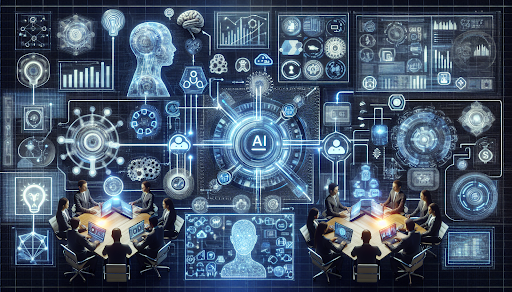As the most valuable of all commodities, time remains a focus in every sector of modern business. Every second spent on repetitive, mundane tasks is a missed opportunity for innovation, strategy, and engagement. Enter AI automation. This isn’t just technology, it’s like THE technology. It turns sluggish workflows into well-oiled, self-regulating machines. But how is it done? Let’s pull back the curtain and reveal how automating repetitive tasks with AI is putting a new paint job on business operations.
What is Workflow Automation?
Imagine a world where your daily grind is not a grind at all. That’s what workflow automation promises. It’s like having an invisible assistant dedicated to handling AI repetitive tasks that clog your to-do list. From scheduling meetings to sorting emails, workflow automation uses software to carry out routine business processes with minimal human intervention.
This isn’t meant to replace humans either–it’s meant to enhance their capabilities. With workflow automation, teams can focus on tasks that require a human touch—creative thinking, decision-making, and personal interactions—while leaving the repetitive stuff to algorithms that never tire.
Exploring Workflow Automation Software
Dive deeper into this technological wonderland, and you’ll find an array of tools designed to automate business tasks with AI. Workflow automation software, sophisticated in its design yet intuitive in use, serves as the backbone of this transformation.
How Workflow Automation Software Benefits Businesses
The perks of integrating workflow automation software are many and varied. Here’s a snapshot:
- Efficiency & Productivity: Automated workflows mean tasks are completed faster and more accurately than ever before.
- Error Reduction: Computers don’t get tired or distracted; they follow rules meticulously, leading to fewer mistakes.
- Scaled Operations: Growing businesses can automate new tasks with ease, allowing them to expand without proportionally increasing their workforce or overheads.
- Data Insights: These systems often provide analytics that help businesses understand bottlenecks and improve processes over time.
- Better Customer Service: When employees aren’t bogged down by routine work, they can dedicate more time to customer engagement and service quality.
All these benefits converge towards one ultimate goal: giving businesses a competitive edge in an ever-accelerating marketplace by leveraging AI-driven task automation.
The Role of RPA Bots in Automation
To truly grasp how AI interactions can streamline business processes, we must acquaint ourselves with robotic process automation (RPA) bots—a term that may sound like science fiction but is very much a reality in today’s corporate landscape.
What is an RPA Bot?
RPA bots are software entities programmed to mimic human actions within digital systems. They log into applications, move files around, fill in forms – essentially, any predictable task across any number of business applications can be their purview, making them perfect for automating repetitive tasks with AI.
How Do RPA Bots Enhance Business Processes?
The benefits RPA bots provide are tangible:
- Versatility: They adapt with agility across industries and departments—from finance for invoice processing to HR for onboarding procedures.
- Precision: Their ability to execute predefined instructions without deviation cuts down on errors dramatically.
- Cross-Application Coordination: Unlike humans who might struggle with juggling multiple systems simultaneously, RPA bots glide through them seamlessly.
- Night-and-Day Operation: These bots don’t sleep – they can work around-the-clock, ensuring continuous productivity.
- User Empowerment: By offloading monotonous AI repetitive tasks from employees’ plates, RPA bots empower teams to pursue more meaningful and satisfying work.
In essence, RPA bots are not just changing how we work, but redefining what it means to work smartly in the AI era.
AI Workflow Integration
Beyond basic task automation lies the unlimited realm of artificial intelligence (AI). When integrated into workflows, AI brings context-awareness and decision-making prowess into play—capabilities far beyond simple rule-based activities. For instance, a company could deploy an AI system capable of reviewing contracts—an undertaking that requires understanding nuances within text, a feat impossible for traditional RPAs alone.
This layer of interpretive computing leads us toward even grander horizons: intelligent process automation (IPA), which combines RPA’s efficiency with AI’s cognitive abilities. With IPA, suddenly systems aren’t just doing—they’re thinking too. It’s here where we begin witnessing transformations such as predictive maintenance schedules in manufacturing or personalized marketing campaigns driven by deep customer insights, all showcasing how AI interactions can streamline business processes.
The future beckons brightly for businesses willing to embrace these advancements. In summary, workflow automation stands as one pillar supporting modern enterprises, taking care of routine chores so human creativity can flourish unencumbered. But when you infuse this setup with AI, a whole new dimension opens up—one where not only are tasks done but also improved upon continuously, leading us toward an age where our digital co-workers become indispensable allies in driving success.
AI Business Process Automation
With the basics of workflow automation and RPA bots covered, it’s time to explore the next frontier: AI business process automation. This is where artificial intelligence steps in to not just automate business tasks with AI but to enhance and optimize them.
How AI Business Process Automation Works
The crux of AI business process automation lies in its ability to learn and adapt. Traditional automation can follow a set of rules, but AI brings a dynamic edge. It analyzes data from various sources, identifies patterns, makes decisions, and even learns from outcomes to refine future processes—truly embodying AI-driven task automation.
This level of sophistication allows businesses to tackle more complex tasks that require judgment calls rather than simple yes-or-no decisions. For example, an AI system could assess customer inquiries submitted via email and determine which department or individual should handle each one based on content analysis—an impossible task for traditional RPA alone.
Moreover, AI can predict outcomes based on historical data. In customer service scenarios, it might suggest the most effective resolution to a recurring issue or flag high-priority cases that need human intervention. These predictive capabilities ensure that businesses are proactive rather than reactive, leading to improved customer satisfaction and operational efficiency.
What is AI RPA?
Moving deeper into the world of automation introduces us to AI RPA, which stands for Artificial Intelligence Robotic Process Automation. This technology marries the rule-based actions of RPA bots with the cognitive computing powers of AI, creating powerful solutions for automating repetitive tasks with AI.
Rather than simply executing predefined tasks, AI RPA systems can interpret data contextually and make decisions accordingly. They’re capable of handling unstructured data such as emails or documents that don’t follow a specific format—a task that would typically require human cognition.
This fusion results in a more resilient form of automation that can adjust its operations based on real-time feedback and changing conditions without needing constant human oversight or manual reprogramming.
Effective AI Workflow Management
To harness the full potential of these technologies, businesses must adopt effective AI workflow management. This involves overseeing the automated processes to ensure they align with organizational goals and deliver desired outcomes efficiently.
Benefits of AI Workflow Management
- Informed Decision-Making: With comprehensive insights provided by analytics tools within these platforms, decision-makers can base their strategies on solid data rather than guesswork.
- Faster Adaptation: As market conditions change or new information becomes available, AI-powered workflows can adapt quickly—keeping businesses agile and competitive.
- Better Resource Allocation: By automating repetitive tasks with AI and optimizing workflows, companies can allocate their human resources towards more strategic initiatives that drive growth.
- Innovation Acceleration: Freed from mundane responsibilities, employees have more opportunity to contribute innovative ideas and focus on creative problem-solving.
- Risk Mitigation: Advanced algorithms help identify potential risks before they become issues, allowing for preemptive action to avoid disruptions or losses.
How is RPA Used in Business?
RPA has found its place across numerous sectors in business due to its versatility and ease of implementation. Let’s look at some use cases of how AI interactions can streamline business processes:
- Sales Order Processing: In retail environments or any sales-driven industry, RPAs quickly process orders by extracting information from purchase orders received through various channels, drastically cutting down processing times compared with manual entry.
- Data Migration & Entry: When companies transition between systems or regularly update databases with new information (like contact details), RPAs handle these AI repetitive tasks flawlessly.
- Credential Verification: Financial institutions often utilize RPAs for KYC (Know Your Customer) processes, where bots verify client credentials against several databases without error.
- Audit Procedures: Auditing requires sifting through vast amounts of records—a perfect job for an RPA bot programmed to identify discrepancies or anomalies within datasets.
The possibilities are virtually endless; any process following a predictable pattern is ripe for an RPA takeover. By now, this journey through the landscape of business task automation has illuminated just how transformative these technologies can be when applied thoughtfully. They’re not mere tools but catalysts for evolution within organizations, ushering in unprecedented levels of productivity, sophistication, and strategic capability through AI-driven task automation.
Does Your Business Use AI?
The future of business efficiency lies in knowing how AI interactions can streamline business processes and implementing the right solutions to automate business tasks with AI. Those who embrace these technologies today will undoubtedly lead their industries tomorrow.



